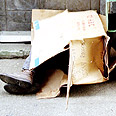
3,000 homeless people living in Israel
Israelis leave home for a week to sit in their sukkah, but thousands of people have no roof over their heads every night. How do they survive, and who should help them?
"I am a single parent who took a mortgage and was unable to pay it back," he says. "I took a loan of NIS 460,000 (about USD 108,000) and today I owe the bank NIS 500,000 (USD 117,000), after a receiver sold my home. The house is gone, and the debt remains. Every day I get phone calls and letters from the bank."
Siom managed to flee the street and return home with his two children. He received help from an aid association in finding a house, and is today one of the association's volunteers. Many other people, however, were no so lucky.
During the holiday of Sukkot, it is a mitzvah to "make your sukkah your permanent abode and your house your temporary abode," but there are those for whom living outside their house is a daily reality.
About 3,000 homeless people known to the welfare authorities live in Israel today. Most of them are childless immigrants from the former Soviet Union, and the others are people who cannot afford to buy an apartment or who prefer not to live within four walls.
According to data published by the Ministry of Social Affairs, 70 percent of the people living on the street are immigrants, alcoholics who sleep on the streets of Israel's main cities. The other 30 percent are people who are mentally unable to live in houses and prefer to spend their lives without walls and ceilings which "irritate them," and people who are forced to live on the street due to their economic situation.
About 2,000 families are evacuated from their apartments every year following their inability to pay back the mortgage payments – usually after being fired or due to an illness or a reduction in National Security pensions.
The good news is that according to the data, not many citizens live on the street due to economic difficulties. The bad news is that reality is about to change, mainly due to the governmental cuts in social services. This situation caused the Yedid Association for Community Empowerment to prepare a bill on the issue, which will be submitted to the Knesset next week.
According to the association's secretary-general, Ran Melamed, "if the government continues with the cutbacks, including in rent aid and public housing, we will see more and more families being thrown out to the street."
"It will not be like today due to their inability to pay back mortgage payments, but because they wont be able to afford the rent. We will thus return to the 1950s with ghettos and housing complexes in terrible maintenance condition, in which crime, violence and distress develop. This is our biggest fear," he said.
According to Yedid's bill, every local authority will get a limited number of apartments from the housing company, which will be defined in advance as temporary apartments for about three to six months, for people without a roof over their heads.
Salary goes to Execution Office
Yoav Sion now lives in a rented apartment, but does not know whether in two months his children will be sleeping in warm rooms, protected from the rain, or will return to the street.
"After living on the street for a month, friends helped me and I rented a house for two months," he recalls. "Then the Ministry of Social Affairs helped me with the rent for three months, and then the Yedid Association helped me contact the Housing Ministry, which gives me NIS 500 (USD 117) for rent, for a year."
"I have two months left, and then it all depends on God. I am living off a guaranteed minimal income of NIS 2,500, with NIS 1,500 spent on the rent. I am not working because the Execution Office confiscates my salary. My situation is very difficult. I have two children aged six and 10, and I am all they have," he explained.
In spite of his distress, Siom finds the time to help other people who have encountered a similar situation.
"I got a lot of help from the Yedid Association. They were my psychologist and psychiatrist, they offered me advice and supported me. Now I am volunteering there. I saw that there are many people in my situation, and I have been volunteering and helping them for a year now.
"For example, there are two families of the Ethiopian community that were deceived by con men, and lost all their belongings. I take them to the association, to the banks, explain, support them, guide them. I am their mouth. These are just two families, but there are many others just like them," he concluded.










